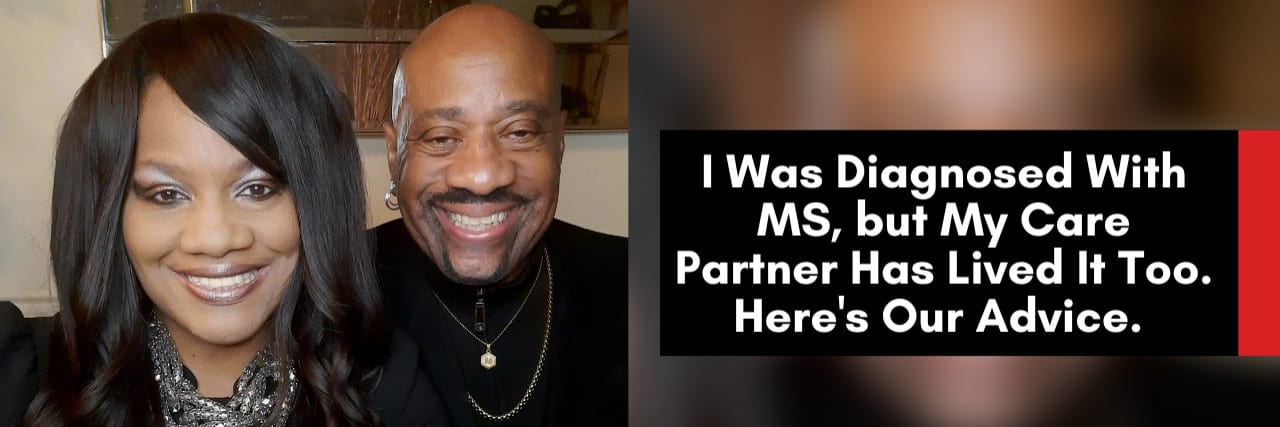I Was Diagnosed With MS, but My Care Partner Has Lived It Too. Here's Our Advice.
I’m what you might call a “seasoned patient.” Living with chronic illness my entire 50 years of life has irrevocably changed the way my mind works. I’m used to playing out every situation in my head, preparing for the best- or worst-case scenario.
That’s where my husband Marvin comes in—the ultimate optimist, always creating a wave of positivity and reaffirming my hope and faith that encompasses me. Marvin came into my life at a pivotal time. We had introspective conversations regarding the love we shared and the life we wanted. Realistically, it behooved us to discuss chronic illness and the impact it might have on us—individually and as a couple. Marvin went all in. After we married, Marvin fully took on the role of care partner, and for over a decade, we intentionally mastered the art of working together, becoming what you might call a seasoned duo.
Then life threw us another curveball—a multiple sclerosis (MS) diagnosis. My second chronic illness. For those who don’t know, I’ve been living with congenital heart disease since birth. But as we always do, Marvin and I persevered and took on this new challenge head-on and hand-in-hand.
For almost two decades, Marvin has never left my side. He comes to each of my appointments ready with his own set of questions and truly acts as my support and partner in every decision—from working with my healthcare team to finding the right MS treatment for me.
One of the most important and necessary aspects of our relationship as not only husband and wife but also patient and care partner is open, honest communication. We make it a priority to communicate and work toward our shared goal—to make sure I achieve the highest quality of life I possibly can so that we can enjoy life together. And I’m not only talking about my physical health.
Self-care and emotional health are the foundation of our daily routines. Marvin and I both know when to give each other time and space, and really champion each other’s self-care. It’s important that care partners find time for themselves too.
Throughout our time together, our relationship has continued to evolve as my health has evolved. I recognize that navigating life with a chronic illness and supporting your loved one isn’t always easy. Here are three pieces of advice for other care partners based on our experiences together:
- Follow the three Ps approach: poise, patience, and perseverance. Marvin uses this approach every day as he takes on the curveballs that my chronic illness may throw our way. Poise helps him balance his emotions and think about things with a fresh perspective. Patience allows him to manage stressful situations and navigate the unknowns of the future with positivity and faith. Last, perseverance gives him the strength to keep fighting and meet any challenge head-on. This approach to life helps us especially on days that I’m not feeling my best and my MS symptoms are flaring up. When I’m having a tough day, Marvin is always so patient and reassures me that everything will be okay.
- Ask for specific care partner resources at your doctor’s appointments. Knowledge is so important, especially when your loved one is dealing with a new diagnosis. Marvin always says that care partners need resources just as much as we MS warriors do, so they know how to provide the best support. If you’re the patient in the relationship and looking for a resource to learn more about MS, ways to holistically manage symptoms, and tips for working with your healthcare team, check out MoretoMS.com and have your care partner ask at your next doctor’s appointment for specific care partner information.
- Prioritize your own self-care routine. It’s important to remember that in the event of an emergency landing, you have to put on your life vest first before you can help anyone else. I know that for care partners, it may be easy to put your needs on the back burner, but in order to give your loved one the support they need, you need to show up for yourself first. For Marvin, his self-care is staying active and continuing to play the sports he loves, like golf, tennis, and racquetball. Self-care allows us to create our own space and happiness—while he’s in his man cave watching sports, I relax in my own space, but don’t tell him, I know he always sneaks in to check on me.
Care partners play such an important role in a patient’s life. For me, I count my blessings that I have someone willing to give me 90% on the days I may only be able to give 10%.
My advice for other patients is to take the time you need to build your support system, which includes your healthcare team. Your care partner can be your spouse, best friend, parent, or mentor—just know that you should not have to fight this battle on your own. Find your person, your Marvin. You will be thankful every day.


